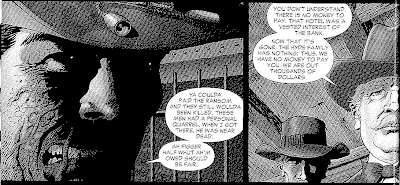
I like the idea of The Broker in this image. Anybody who has ever opened a superhero comic book or has ever seen a superhero movie knows that a villain is likely to take up residence in a location where he or she (or it) could remain under the radar from the authorities. Outside of legitimized villains like Lex Luthor, who have the pleasure of living in their homes, typical hideouts include abandoned warehouses, factories, amusement parks, and toy stores. I still have not been able to come up with an adequate theory as to why villains have such proclivities towards toys -- perhaps it has something to do with having easy access to seeminly innocent gadgets, which could in fact cause substantial harm to a superhero with proper adjustments (those little bomber helicopters seem particularly dangerous).
Let's take the case of Gotham City. Indeed, when one thinks about poverty-striken and run-down cities in the DC Universe, one instinctively thinks of either Bludhaven or Gotham City. That means that there should be many abandoned buildings, warehouses and amusement parks for villains to choose from. Here's the problem: the villain count in Gotham city is growing rapidly, especially following the "death" of Batman. As such, there is heavy competition for the best hideouts, especially among the newer villains trying to break into the business. And even though there are likely many abandoned buildings, obviously not all of them are useable or are located in areas that maximize a villain's ability to remain hidden.
Hence, there are lots of villains and a limited number of vacancies. Not to mention, criminals might be a cowardly and superstitious lot, but there's no denying that they're busy. They have better things to do then look around for a place with adequate plumbing. So what's the solution?
Enter The Broker. An invention only possible from the mind of Paul Dini, The Broker seems to be an independent real-estate agent exclusively for supervillains, who finds potential hideouts for his clients and charges them a finder's fee. This might be a profitable enterprise for crafty businessmen. Let's take a look at average salary statistics for real estate brokers from payscale.
Median Salary by Employer Type - Job: Real Estate Broker (United States)
It looks like the self-employed brokers make the most annually. I am assuming that The Broker is self-employed and does not work for some evil supervillain brokerage firm, so this is fortuitous news for him. What about statistics by city?
Median Salary by City - Job: Real Estate Broker (United States)
If you take a look at New York (the closest model to Gotham City), you will note that average broker salaries seem to pretty decent, relative to other cities. It is not as high as Phoenix or Atlanta, but higher than Los Angeles, Chicago and Houston. So, it seems as though The Broker had picked a lucrative enough criminal profession in a decent location.
There are, however, a few major problems with The Broker's choice of a career path. First of all, I think The Broker would need to charge larger fees in order to compensate for occupational hazards. The guy is working with supervillains. It's a dangerous line of work and it is not unreasonable to assume that some of these villains might not pay, might turn on him, and might even harm him. Look at what happened to the gentleman who tried to sell the Joker the abandoned amusement park in The Killing Joke. I think that even a high of $60,000 a year is not a generous enough salary for dealing with the dangers that The Broker has to face on a daily basis.
Secondly, The Broker is limiting himself to buyer services. Typically, brokers act as intermediaries between buyers and sellers. They help buyers find affordable homes for the lowest possible cost, but they also help sellers sell spaces for the highest possible costs. The very nature of matching up criminals with abandoned hideouts prevents The Broker from providing seller services, from which brokers make a large percentage of commissions. He is not speaking to criminals on behalf of any owners and does not own the buildings himself. It is an illegal transaction, which also has the potential to be discovered by the authorities. Not to mention, he is most likely dealing with up-and-coming villains such as the BoneBlaster. These newbies are not likely to be able to afford the high-scale, upper-class abandoned warehouses, but rather the more modest ones in questionable neighborhoods.
Thus, it seems The Broker is actually quite restricted in the income he could make from his business. Though creative, a "thriving business" in Gotham City it is not. I highly doubt it would last long and I believe The Broker would be filing for bankruptcy rather quickly if he continued.




